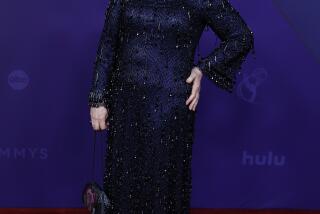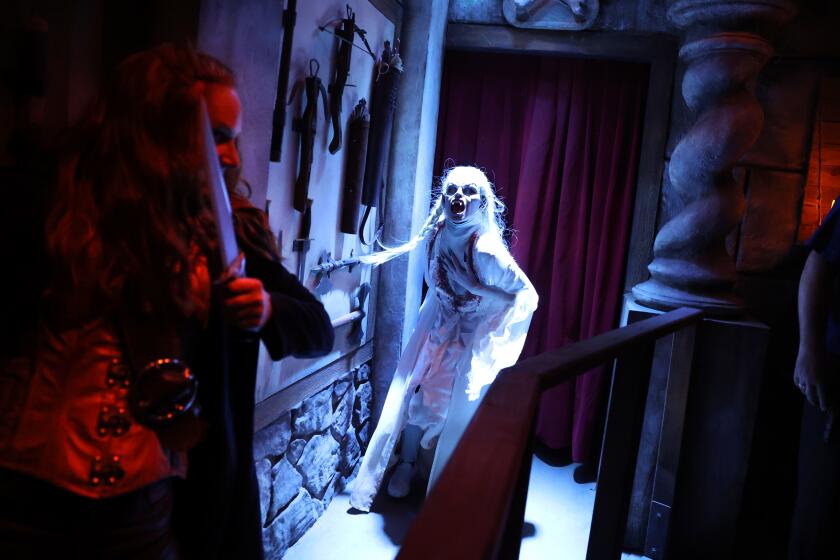Sunday Conversation: Thomas Jane
Thomas Jane, 42, returns Sunday night for the third season of the HBO dramedy “Hung.” He stars as Ray Drecker, a struggling high school teacher and coach who deals with Detroit’s crumbling economy by branching out into prostitution.
What’s coming up this season for Ray?
When we started the show we got a lot of play out of the fact that the economy had gone into the [toilet]. Our story was about people trying to make ends meet in unconventional ways. Now by Season 3, the economy is still in the [toilet], and the prospect is a bit depressing. So the creators — Dmitry [Lipkin] and Colette [Burson] and HBO — wanted to take the show into a funnier, faster-paced, sexier place. I want to turn on the TV and forget about the world’s problems for a minute.
So we’ve got Ray having been fired from his teaching job. He’s going into ho-ing full-time. Him and Tanya [his pimp, played by Jane Adams] have started a business — the Happiness Consultant business is doing really well when we open Season 3. Ray’s fixed up his house. He’s got a new sports car. He’s wearing new suits. He’s shaving. I’m in better shape because I’m taking the ho-ing job seriously. It really is paying the bills, and the fact that we’re doing quite well with it is really fun and refreshing.
In the first two seasons, Ray has strictly female clients only. So whose policy was that — yours or Ray’s or both of yours?
Honestly, an actor is not going to tell HBO what to do or dictate the tenets of the role, although there is some wiggle room there. They like to think they can tell you what to do, but really, sorry, I’m the guy that has to come out of my trailer to perform the feat. I’ve always said that the year that Ray ends up with a penis in his mouth is the last year of the show. And I’ve said it jokingly. The comment functions on a couple of different levels. There’s the idea that Ray is a very heterosexual, corn-fed, red-blooded American, so I’m not comfortable with the definitions of sex that are outside of the heterosexual man-on-top, female-on-the-bottom definition.
When you say “I,” are you speaking as you or as Ray?
I’m talking as Ray. Ray’s definition of sex is very narrow, and that makes for good television. If we had a character that was very accepting and free and open to trying new things, we’d be [having sex with] an elephant in a circus by Season 3. We get much more mileage out of taking a guy who’s very repressed but doesn’t even know that he’s repressed.
But you do push the boundaries this season, right?
Absolutely, because if you take that definition of Ray’s sexuality, then it gives you so much to play with. This year I become the conduit for two Midwestern women to express their sexual feelings for each other. And I also date; I take on a transgender client this season, which turned out to be one of my favorite episodes of the year.
You’ve gotten a lot of grief in the gay media.
I think they took my comment that it would be the last year of the show when I ended up with a [penis] in my mouth, think they took that comment to be anti-gay. And then I got a chance to explain myself a little further, and I think people respected the explanation that I gave. And then I had to get up and pee during the Herve Leger [fashion] show, and everybody flipped out about that. That became a separate issue.
Our entertainment has become so politically correct that we can no longer comment on social issues in a meaningful way. At the same time we’ve become so jaded that whatever you have to say about something seems passé before it passes through your lips. So this combination makes for really poor controversy, and controversy breeds discussion, and discussion breeds elucidation. And elucidation breeds change.
Well, here’s your chance.
Hey, you grow up as an artist in a big city, as James Dean said, you’re going to have one arm tied behind your back if you don’t accept people’s sexual flavors. You know, when I was a kid out here in L.A., I was homeless, I didn’t have any money and I was living in my car. I was 18. I wasn’t averse to going down to Santa Monica Boulevard and letting a guy buy me a sandwich. Know what I mean?
Do you feel that experience had any cost or was it just doing what you had to do?
You’re a lot more open to experimentation as a young man. And for me, being a young artist and broke in Los Angeles, I was exploring my sexual identity. And probably because of my middle-class, white blue-collar upbringing, I would have never had the opportunity to confront some of my own fears and prejudices had I not been hungry enough to be forced to challenge myself in that way.
So then it was productive for you in terms of self-knowledge?
Yeah, absolutely. It blew the doors off of my conventional upbringing and thinking and opened up possibilities for me that were akin to World War III. And then you actually have a choice, and I chose to be a heterosexual guy because that’s what my DNA dictates and my nurture dictates that I am.
Then is that a choice?
I don’t know. I think up to a point it’s a choice. But I’ll tell you what — it’s not a choice until you’re open enough to experience both male and female sexuality. Until you’ve tasted the food, you don’t know whether you’ll like it or not, as my mom always said.
More to Read
The biggest entertainment stories
Get our big stories about Hollywood, film, television, music, arts, culture and more right in your inbox as soon as they publish.
You may occasionally receive promotional content from the Los Angeles Times.










